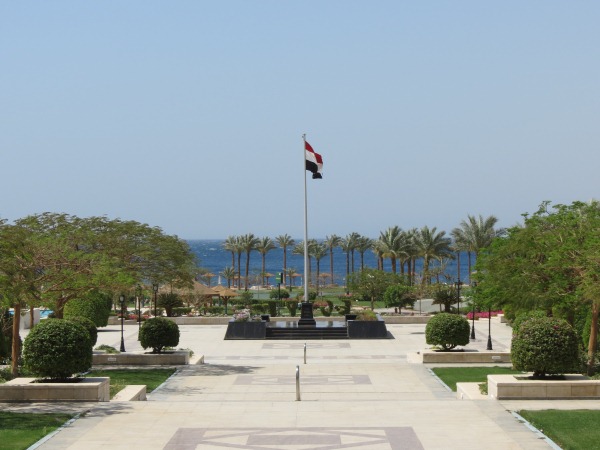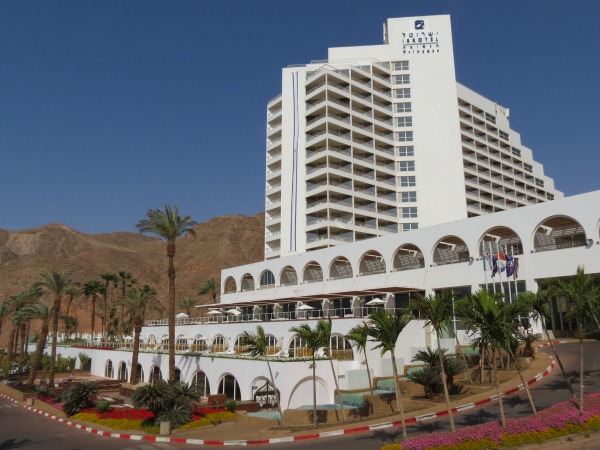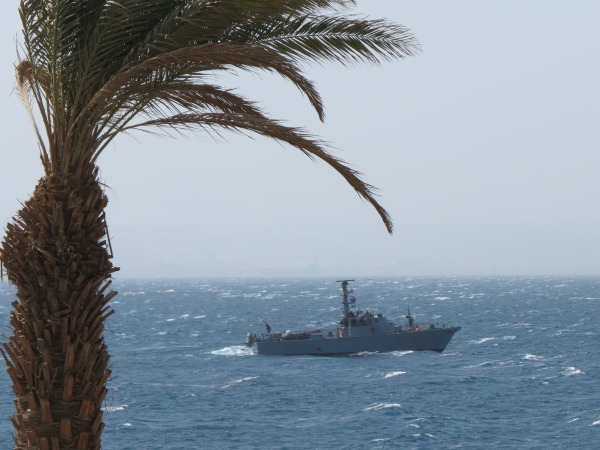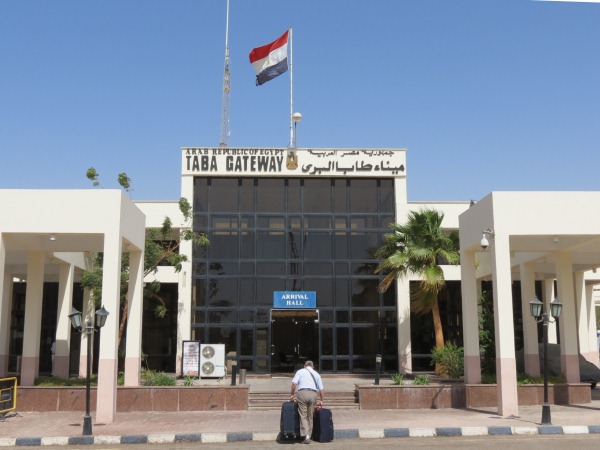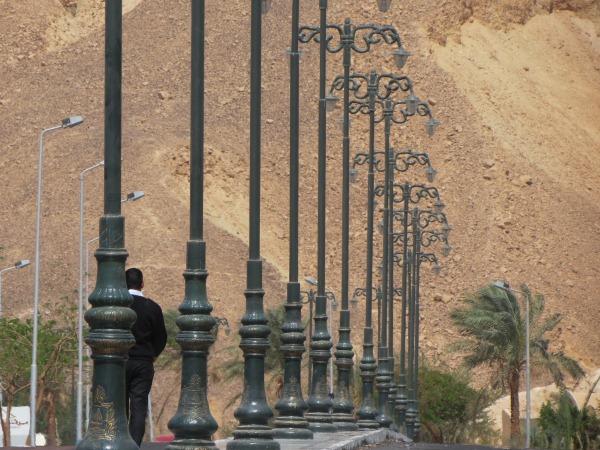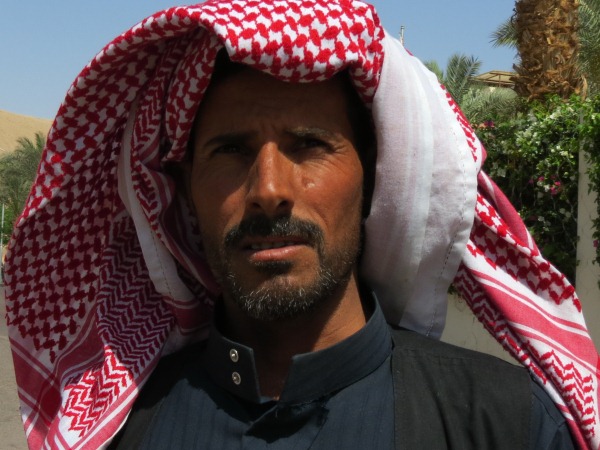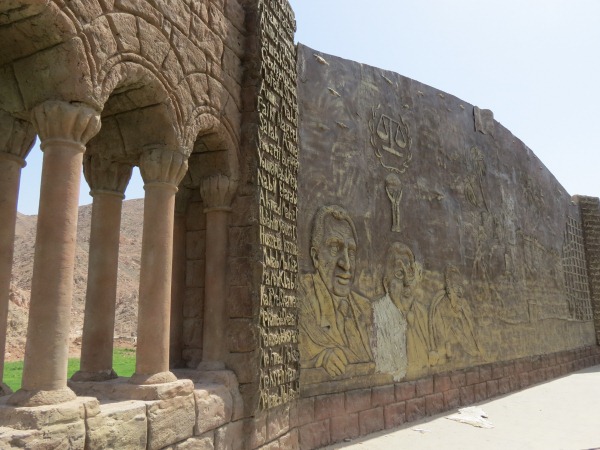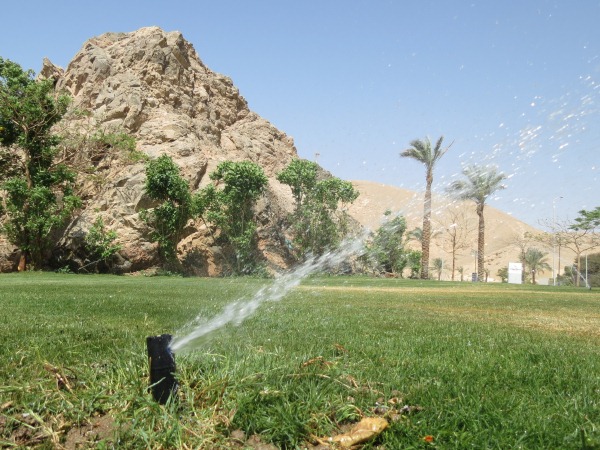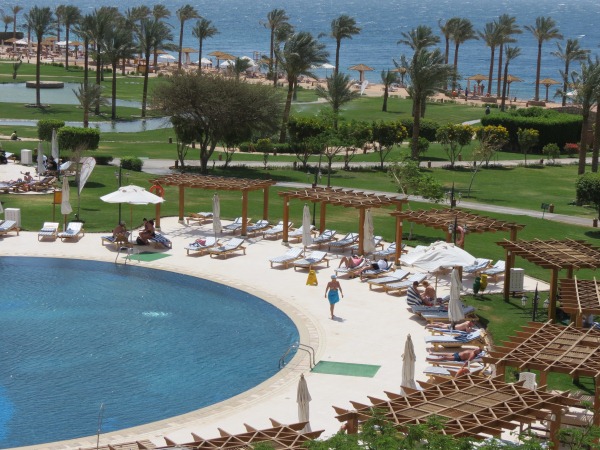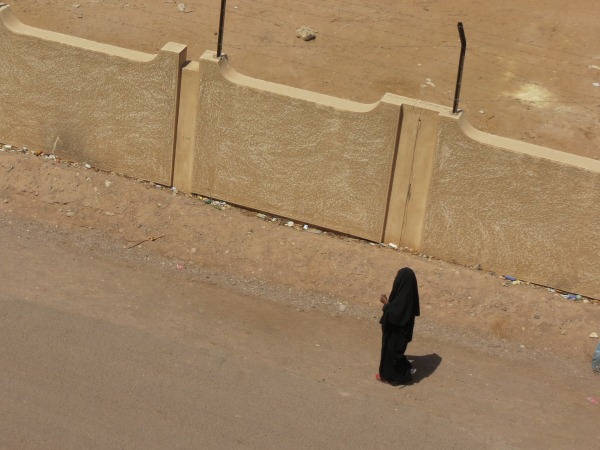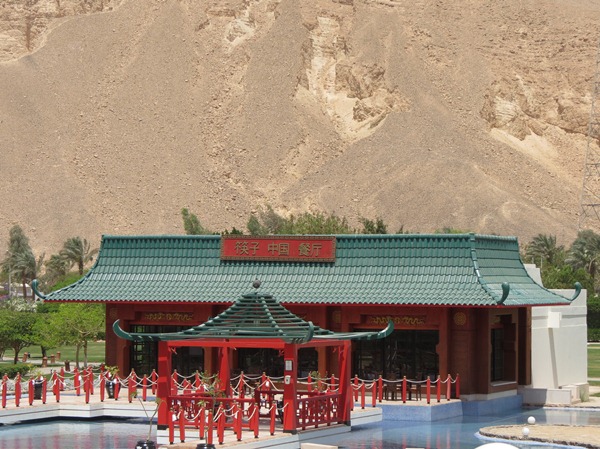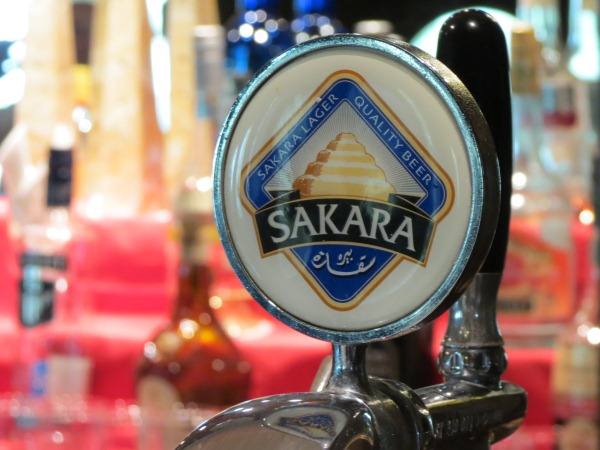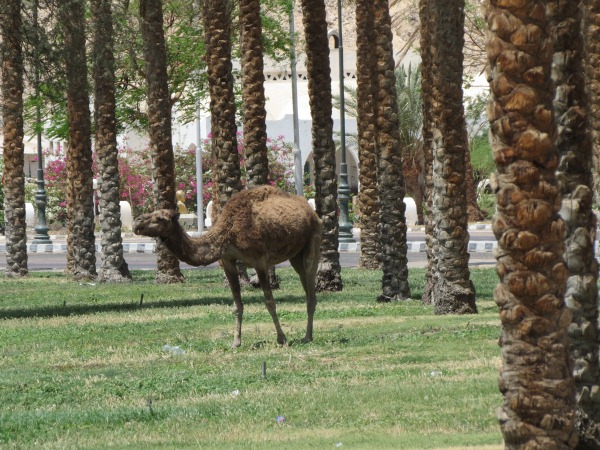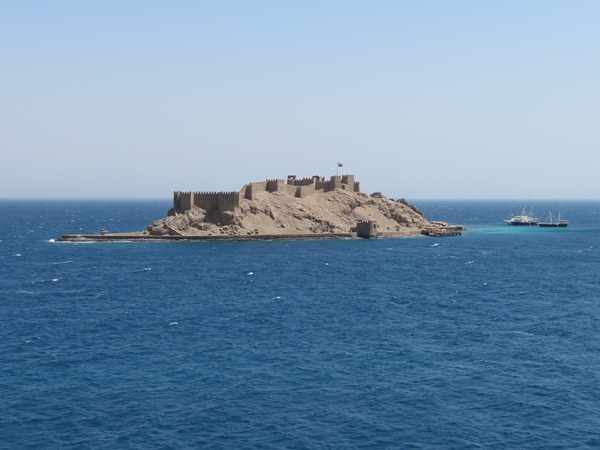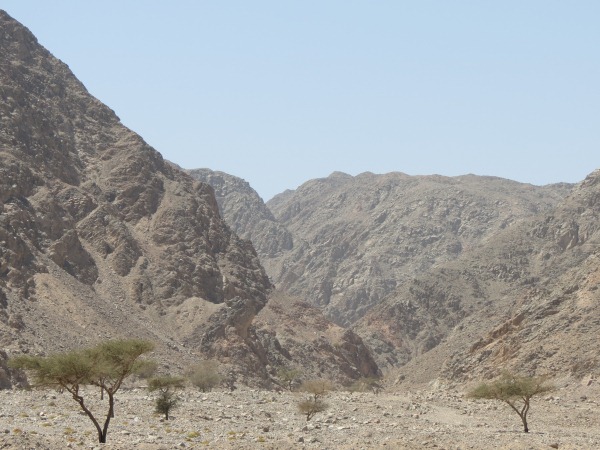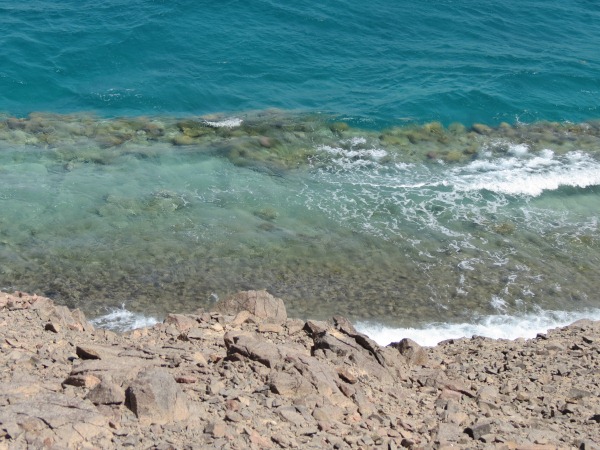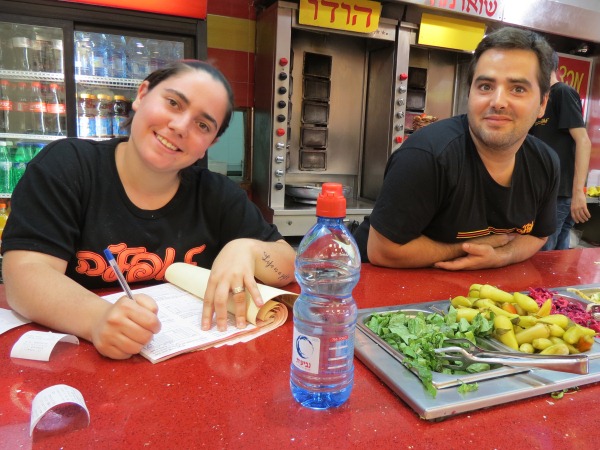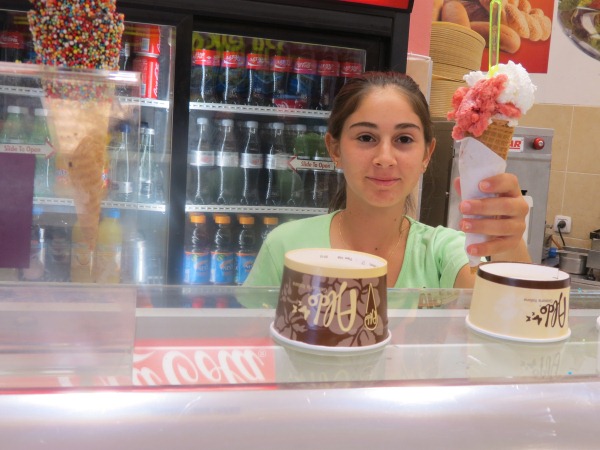From Taba to Taba via trouble.
The government issued a severe travel warning, urging Israelis to stay out of the Sinai Peninsula. I’ve bumped into those occasionally in newspapers and on the radio over the past few days, yet am still planning to venture in briefly. It’s not that I doubt the sincerety of the warning: while much Israeli fear-mongering is unfounded propaganda, Sinai terror alerts are sometimes followed by a fair bit of blood. I simply owe my readers and myself a true taste of the Egyptian border.
This will be a difficult border to follow. The road running along it within Israel, Route 10, is commonly closed to civilian traffic. Since the disengagement from Gaza, no border crossing with Egypt serves Israeli civilians besides the one at Taba, just south of Eilat. For a glimpse of our largest and most fabled neighbor, I arrive in the morning at the first of two hotels that Aboud the boat owner had pointed out to me yesterday.
Directly across from it floats an Israeli Navy boat.
Then, a mere two-minute walk southward, a new land appears before the traveler: mighty Egypt, the singing heart of the Middle East, land of the Pharaohs, of Tahrir, and of kushari, that awful mix of lentils, rice and macaroni which may well be the most sorry excuse for food known to mankind.
Photos of Mubarak no longer grace the entry terminal, and have not yet been replaced by photos of anyone else. The jury is still out.
My passage is smooth, since the queues are short. Taba, on the other side, is a vacant boulevard running between three shiny white hotels and overlooked by the communication towers of police stations. It may very well be the eeriest place known to mankind, at least today. A group of Romanian pilgrims heading for St. Catherine’s monestary piles into a tour bus and vanishes. I now share this entire lunar Champs Elysee with four local taxi drivers.
They soon learn that I’m not going anywhere, and get annoyed. One of them, named Uda, gets annoyed in fluent Hebrew. He tries to persuade me to travel at least a few kilometers down the coast, to some nice vacation huts, for just 50 Egyptian pounds, which equal about 13 dollars. Back in the day, this amount of money took four of us from the border all the way to Cairo. Could Egypt have changed this much?
It has changed. I am walking down Taba’s boulevard feeling strangely threatened, more so even than when I first came here at the age of 21. That was my first visit as an Israeli to an Arab country, and this one has an air about it of being the last.
Actually, the very first time I was here was 32 years ago, and this was not an Arab country per se. The year was 1980 and Israel was just about to return the peninsula, three times its own size, to Egypt in accordance with the Camp David Accords. My family rolled south to bid farewell to this love story of desert and sea. I was five years old and yet still remember a lot to this day: wind in the palm trees at Sharm Al-Sheikh, our tent on a forgotten beach, and here, just south of Taba, the astonishing beauty of rocky Pharaoh’s Island, topped by crusader ramparts.
At the age of five I hadn’t yet heard of the crusaders. All I knew was that there was a thundering silence along these shores. Later, coming here as an adult, I felt magic and thrill, and now both are overshadowed by doubt, even fear.
I stop by Taba’s eeriest structure: a damaged bronze bas-relief featuring a representation of Pharaoh’s Island, some people in neckties and a list of names. To find out what this means, I must ask the guard at the nearby Mövenpick resort hotel, the only man visible in this hellish paradise of grass and rock, now that Uda found a passenger and moved on.
The guard explains that the monument celebrates Egypt’s success in returning Taba to its hands in 1988. This small stretch of coast remained disputed territory for another decade or so following the peace accord. Where the Mövenpick now stands, an Israeli named Rafi Nelson ran a vacation village, where Bohemian Tel Avivians famously lazed. Then an international committee ruled that Nelson must take his long beard and staple straw hat back north. The names on the monument are of the Egyptian negotiators responsible for that achievement.
Israelis kept coming to Taba, drawn by attractive prices and the presence of a casino, which often reversed the effect of the attractive prices. Then, in 2005, terrorists set off a bomb at the Taba Hilton, killing 34 guests and employees.
“Snap snap and leave,” advised the English warden at my Eilat hostel. This is sound advice, and I have already taken fine photos but haven’t yet eaten a thing since the morning. I ask the guard whether I may step into the Mövenpick to have a cup of coffee. He agrees and keeps my passport as collatoral.
From within, the Mövenpick looks like the dream of someone who fell asleep with a golf magazine on his lap. I must take at least one more photo of the insanely lush grounds, stretching to the sea outside the lobby’s wide windows, but the angle is awkward. I step into a corridor and ask a maid for permission to shoot from a room’s balcony.
Here’s what I capture:
And since the room in question is near the resort’s walls, here’s what I capture looking in the other direction.
“May I go up to the roof?” I ask.
The maid passes the question on, and the answer is no, so I take one more shot, in the direction of the Chinese restaurant.
And another of the beer tap at the bar, where I chat with the bartender about football. He is a fan of Al-Ahaly, the team that was recently involved in a disastrous riot which met with police brutality. The event claimed 74 lives.
“Mubarak supporters did that, to give the revolution a bad name,” he explains. “Mubarak should be killed,” he says, and slits his throat with an index finger.
That’s enough of this place. I wish Egypt all the goodness in the world. I love it. No other country ever treated me with the kindness and hospitality I have encountered here in the past, but something fails to click today. I head out, pick up my passport and return to the street. I even get to capture the following pastoral image before the guard calls me to return.
He wants to photocopy of my passport. I hand it over. He invites me to sit in his booth. I accept. He talks a lot on his walky talky. I wait patiently. He introduces me to a gentleman from the Tourism Police, I shake his hand. The policeman asks me to accompany him to the lobby then instructs me to wait. I figure that I have been detained.
If you ever get to be detained anywhere, I recommend the lobby of the Taba Mövenpick. Not only for the air conditioning and ambient music, but for the company of Brim, who runs the local gift shop. Since no one forces me to remain seated, I walk over to the shop and find one of those rare people who make you relax even at a moment so troubling. “Brim is short for Bremier,” he expalins, “Bremier – like first, because I’m first to reach all the girls.”
To get my mind off of my current situation, I ask Brim about Egypt’s current situation. “We are sticking to our revolution,” he says. “For 60 years we lived under military rule. We won’t have more of that.”
“But right now you are literally under military rule. I mean – the army’s in power.”
“The army is only keeping us secure, so that Hamas or, I don’t know, Hezbollah, or the Americans, or you guys won’t come in and take advantage of our transition phase.”
This may be the issue. An hour passes and I am still in the lobby, without my passport. Then a member of hotel security arrives. He accompanies me outside the building, then around it, across an empty parking lot, into a grimy corridor and through the doors of an office, where three unhappy men without uniforms sit and stare at me through cigarette smoke.
As soon as I see this office, I know that getting out of here will not be easy. I nod politely, take a seat as directed and quickly, before my phone is taken away, text Ruthie the name of the Eilat hostel where I left my belongings.
Behind a desk heavy with small flags, medals and law enforcement paraphernalia sits a man whose office this clearly is. He goes through my photos. They do not please him. Here’s a navy boat. Here are police antennas. “What business do you have here?” he asks.
I choose not to describe the Round Trip, for fear that any talk of unauthorized reporting with a focus on borders will seal my fate. Instead I describe myself as a happy-go-lucky tourist and amateur photographer who stopped here for a coffee on his way to Pharaoh’s island. He is not convinced. “You are Israeli, but you speak Arabic. You take pictures of our police stations, and you are trying to sell me stories.”
I change my mind and bring up +972. Another man in the room, a scribe, writes down the URL. I suggest to the man behind the desk that he go online and check it out. He shows no interest. “There is something wrong about you,” he says. “You are going from here to the kalaboush.”
The word kalaboush is used also in Hebrew. It means prison.
My dear readers, those of you who have accompanied me thus far know well that this is not the first time I have been in trouble on my travels, that I have been detained by now and interrogated both in my own language and in Arabic. I have been worried and upset in all those situations, but never terrified.
This time I am. Israelis have spent years in Egyptian prisons for charges of espionage that proved to be bogus. The most recent such prisoner could only be freed in a prisoner swap. This man wants to send me to an Egyptian prison, where I’ll be lucky to get kushari, a prison in an Arab country still unstable following a revolution, where the Muslim Brotherhood could come into power any day. He now mentions some film named “Among Cousins,” which appears to concern Israeli spies in Egypt and their fate. “You haven’t seen “Among Cousins?” he asks and laughs as I shake my head.
The third man present in the room now begins to ask me questions, political questions, such as, “How do Israelis feel about Egypt’s recent refusal to sell Israel gas?”
I give some answer or another. I am disorientated, nauseous. I need to work every bit of brain I have to try and convince these gentlemen that I am perfectly innocent. The third man listens to my answer intently. Then he takes my camera and begins to delete questionable photos. Mr. Kalaboush shouts at him in Egyptian Arabic which I can’t fully understand. I am not sure whether he wants him to delete them all or to preserve them as evidence.
They argue, but the third man is relaxed and appears to ultimately have higher authority. He also appears to have experienced a change in attitude following one of the answers I gave, specifically the one about the gas, for some reason, and now contemplates letting me go.
After awhile, my passport returns to the room. It’s been copied three time, and each copy is clipped to a report of the interrogation. Those are handed out to all those present except myself, and then, to my amazement, I receive the original. Mr. Kalaboush is deeply displeased, but the third man has made a decision. He hands me back my camera with many, but not all of the photos deleted.
Before I manage to grab it. Mr. Kalaboush leans over the desk, takes it and removes the battery. He now hands me camera and battery separately and tells me that I may only reunite them five kilometers south of Taba. I am banned from taking photos north of Pharaoh’s Island ever again.
This, then, is the next one I take.
Behind me is the wild desert, free of lawns.
While below, in the water, the coral reefs are visible.
This may well be the greatest beauty known to mankind. I am so thrilled to be free and so taken by the sense of home upon crossing successfully back into Israel, that I photograph the friendly shawarma vendors at the Red Sea Mall food court,
and the girl at the adjacent ice cream parlor, who hands me a sweet treat.
This is the first and only post in this series which has no deliberate theme, nor is it centered around some idea or a message. It’s entirely up to you, my readers, to make up what you will of my day. Is the story random, or is it meaningful? Am I simply an idiot, or have I finally, today, been brought in touch with the realities of the region? After all, any individual of Arab background taking photos around Tel Aviv’s Hilton would be subject to the same treatment or worse.
One thing of which I am confident, is that you, my readers, had more than a bit to do with my mysterious release. Not only have many of you donated to this trip’s expenses, but over the past few weeks, you have also kept me feeling in good company by commenting, debating and sending words of encouragement, and all of you have infused my spirit with confidence. All of you, even those who disagree with the views presented here, have sent good energies my way. These good energies worked. I thank you deeply and urge you to visit Egypt without fear. Just don’t ask to go shoot from the roof.
_______________________________________
The Round Trip thus far!
View Larger Map
Thanks for reading and taking part in the adventure. All writing on this site is done voluntarily, so if any of you would like to pitch in directly for my travel expenses, please click here or on the “donate” button at the top of this page to do so. Donors who contribute more than $25 will receive free the first part of the three-part ebook (compatible with iPad) that will be released this summer. I’m deeply grateful to those who already donated. Thank you so much! This project would be impossible if not for you.
Relive the first two journeys:
The September Journey
The Christmas Journey


